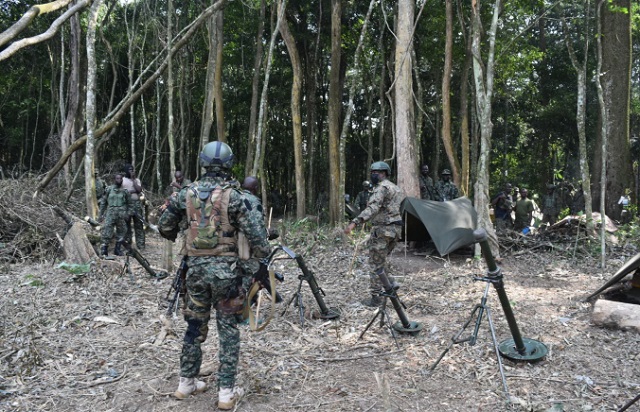
The long awaited judgment found the two countries in similar circumstances that led to the case
Kampala, Uganda | IAN KATUSIIME | Twenty three years after the Democratic Republic of Congo (DRC) instituted proceedings against Uganda on accounts of armed aggression, at the International Court of Justice (ICJ), there has been a final ruling.
The ICJ ordered Uganda to pay $325 million as compensation for its armed activities on the territories of the DRC. The judgment has no appeal and is binding on the parties. The reparation was a tiny fraction from the $11 billion that DRC demanded Uganda to pay.
The ICJ, the principal judicial organ of the UN, ruled on Feb. 9 that Uganda should pay $225m for damage to persons, $40m for damage to property, and $60m for damage to natural resources. The court ruled that the amount will be paid in five annual installments of $65,000 starting September 1.
“The court notes that the reparation awarded to the DRC for damage to persons and to property reflects the harm suffered by individuals and communities as a result of Uganda’s breach of its international obligations,” the Court’s President, Joan E Donoghue, said.
The ruling on the reparation was a culmination of a drawn out judicial process that kicked off in December 2005 when the UN court found Uganda to have violated principles of non-use of force in international relations and non-intervention. The Hague-based court ruled at the time that Uganda violated its obligations under international human rights law and international humanitarian law; and that it violated other obligations owed to the Democratic Republic of the Congo.
After the 2005 ruling, Uganda never paid the reparations but appealed the court’s decision in a process that dragged on for seventeen years.
However the ICJ in the 2005 ruling also adjudged DRC to have violated obligations owed to Uganda under the Vienna Convention on Diplomatic Relations of 1961.
In the $225 million damage Uganda is going to pay as a result of its war mongering in Congo, court said evidence presented found that deaths attributed to Uganda ranged from 10,000 to 15, 000 persons. The death and destruction unleashed by the Congo wars in the 1990s and early 2000s led to an outpouring of refugees in the region- some of whom ended up in Uganda.
Ituri province
In its ruling on damage to natural resources, the court had a damning indictment on Uganda regarding the Ituri province in DRC which was the epicenter of the aggression. “Outside Ituri, Uganda owes reparation for damage related to natural resources where UPDF involved — In Ituri, Uganda owes reparation for all acts of looting, plundering or exploitation of natural resources…”
Uganda was also found responsible for damage resulting from looting, plundering and exploitation of gold, diamonds and coltan in the famous case that was filed in 1999.
UPDF are back in Ituri on a mission hunting for the Allied Democratic Forces (ADF), a rebel group that has used the area as its base for years. The ruling presents complications for Uganda because the UPDF are involved in constructing roads and other unknown ventures where there could be a thin line between hunting for rebels and violation of international law.
The top UN court also ruled that Uganda owes reparations for looting, plundering and exploitation of timber. Over the years, top Ugandan politicians and UPDF Generals were accused of plundering timber and the above minerals when Ugandan troops were deployed to fight on Congo territory in the 1990s after a fallout with Congo’s leaders.
Uganda was also found liable to make reparation for damage in part of Okapi Wildlife Reserve and Virunga National Park in Ituri, which its troops were occupying.
The Attorney General Kiryowa Kiwanuka in a statement on the ruling said that “the decision did not meet the standard of fairness we expected.”
“We challenge and reject the findings of wrongdoing on the part of the Uganda People’s Defense Force (UPDF) which was singled out notwithstanding the acknowledgement by the court of the existence of so many belligerents in the conflict. The UPDF was and remains a disciplined force and a force for good in all the countries it has operated in to this day,” the statement added.
Kiwanuka said the court’s decision failed again to understand African matters and made no contribution to current efforts to resolve the security issues that persist. He said would continue to engage DRC to resolve the matter.
“This however shall not deter us from continuing to engage the government of the DRC to resolve this matter,” he said.
Uganda is currently enjoying warm relations with its western neighbour. The two countries are working on a 223km joint road project while their troops are also working together in the fight against the Allied Democratic Forces (ADF) rebels; an armed guerrilla group opposed to President Yoweri Museveni’s government in Uganda but based in eastern DRC.
The UN Court is composed of 15 judges elected for a nine-year term by the General Assembly and the Security Council of the United Nations. The seat of the Court is at the Peace Palace in The Hague (Netherlands).
The Court has a twofold role: first, to settle, in accordance with international law, through judgments which have binding force and are without appeal for the parties concerned, legal disputes submitted to it by States; and, second, to give advisory opinions on legal questions referred to it by duly authorized United Nations organs and agencies of the system.
****
 The Independent Uganda: You get the Truth we Pay the Price
The Independent Uganda: You get the Truth we Pay the Price


